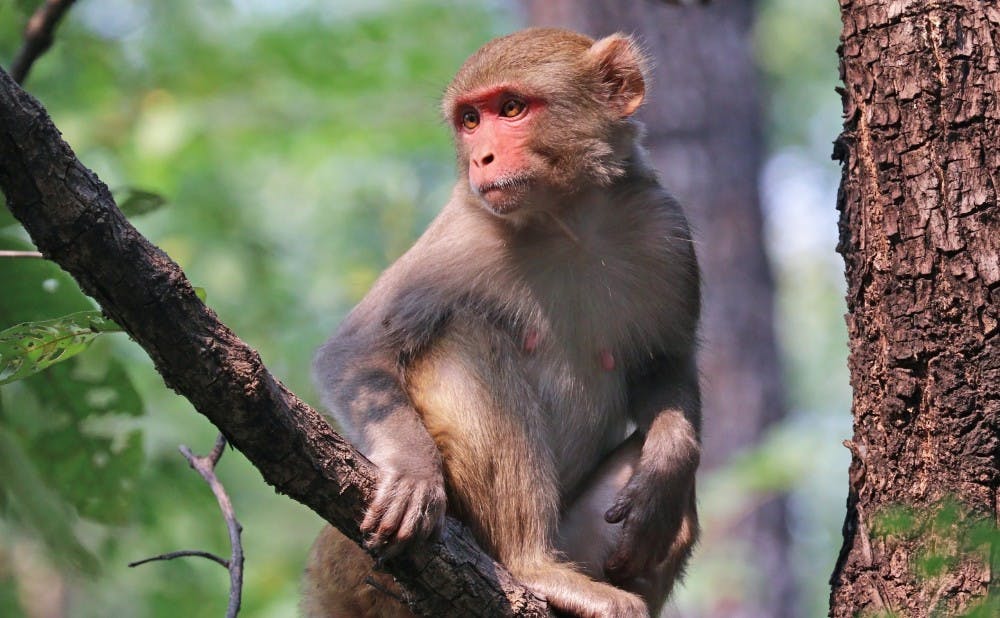Duke is in trouble with PETA.
In March, PETA called for an investigation of Duke’s Institutional Animal Care and Use Committee for approving a study in which 10 rhesus macaques were deprived of fluid to compel participation. The purpose of the study was to test whether sex and status in advertising is as potent on the monkeys as it is in humans.
“Any teenager in this country can tell you that sex sells,” said Emily Trunnell, PETA research associate and IACUC liaison. “The monkeys were deprived of water in order to coerce them into participating in the experiment for small drops of fruit juice, to draw conclusions we already know. The experiment was pretty much a waste of time and money, and animals suffered in the process.”
Michael Platt, former director of the Duke Institute for Brain Sciences and current James S. Riepe University professor of neuroscience at the University of Pennsylvania, was the principal investigator of the study. He hypothesized that the animals would show a preference for brand logos after being conditioned to associate them with certain images of other macaques.
The investigators paired logos for brands like Nike, Adidas, Acura, Pizza Hut and Domino’s Pizza with images of either female macaque genitalia, subordinate male macaques, dominant male macaques or scrambled control images.
The study mostly confirmed the experimenters’ prediction—finding that “monkeys formed preferences for brand logos that were paired with images of female hindquarters and the faces of dominant males, but not for brand logos that were paired with the faces of subordinate males.”
PETA’s main concern with the study was its lack of detail regarding how long the investigators deprived the macaques of fluid for. The methods section described how much water the monkeys had access to during the study—at least 20 mL of water per kilogram of body weight “with the opportunity for more during the task”—but did not specify how long the fluid deprivation went on for before the monkeys completed the task of selecting images on a screen for a fruit juice reward.
The section did, however, describe how veterinary staff closely monitored the appearance, body weight, skin turgor and fecal matter of the monkeys during the fluid deprivation period to monitor their health and hydration status.
“Other IACUCs have denied [fluid deprivation] protocols because they’re unnecessarily inhumane and there are other, more humane methods that can be used, such as giving animals a preferred treat,” Trunnell said. “The problem that experimenters have with foregoing fluid deprivation is that the monkeys don’t work as long as they want them to, so they have to spend more time and more effort to complete their experiment.”
In a letter addressed to President Vincent Price, PETA further argued that there was no need to use macaques as a model organism for this study in the first place.
The letter states that “macaques do not possess purchasing power in current society, [so] we have no need to know what influences their brand preferences.” Human volunteers could easily have been used in their place, Trunnell noted. She claimed that Platt chose the monkeys instead for convenience.
“Rhesus macaques have been bred for research and the experimenter, Michael Platt, has been using them almost his entire career,” Trunnell said. “Ten years ago, he was drilling metal screws into their skulls and implanting wire coils under their eyes.”
The study emphasized the importance of understanding how humans’ receptiveness to sex and power in advertising originated in our shared ancestry with more ancient primate species. The authors claimed that their findings demonstrate how the “neural mechanisms that prioritize information about sex and status are shared between macaques and humans.”
In its letter, PETA implored Price to investigate the Duke IACUC for approving the study. PETA also wrote to University of Pennsylvania president Amy Gutmann asking that she suspend any planned or current monkey advertising experiments and request Platt’s resignation. PETA has also contacted the companies whose logos were part of the experiment to let them know how their logos were used.
Michael Schoenfeld, vice president for government relations and public affairs, defended the study’s ethical use of the monkeys.
He wrote in an email that “all animal-related research at Duke adheres to the highest standards set by the U.S. Department of Agriculture, the National Institutes of Health and AAALAC International,” a voluntary accrediting organization for animal care units.
Platt corroborated the soundness of the study, writing in an email that it “adhered to the [U.S. Public Health Service] Guide for the Care and Use of Laboratory Animals, was overseen by Duke University Laboratory Animal Resources staff and veterinarians, [and] was funded in part by the National Institute for Mental Health.”
“A poll came out a few years ago showing that 50 percent of the U.S. population opposes the use of animals in experiments, and the 50 percent that doesn’t is only okay with it on the basis that the harm animals suffer will somehow benefit humans,” Trunnell said. “But this experiment obviously doesn’t, and it involved harm to animals. We just want the IACUC to be accountable. It has the public's trust and needs to follow the letter of the law.”
Get The Chronicle straight to your inbox
Signup for our weekly newsletter. Cancel at any time.

